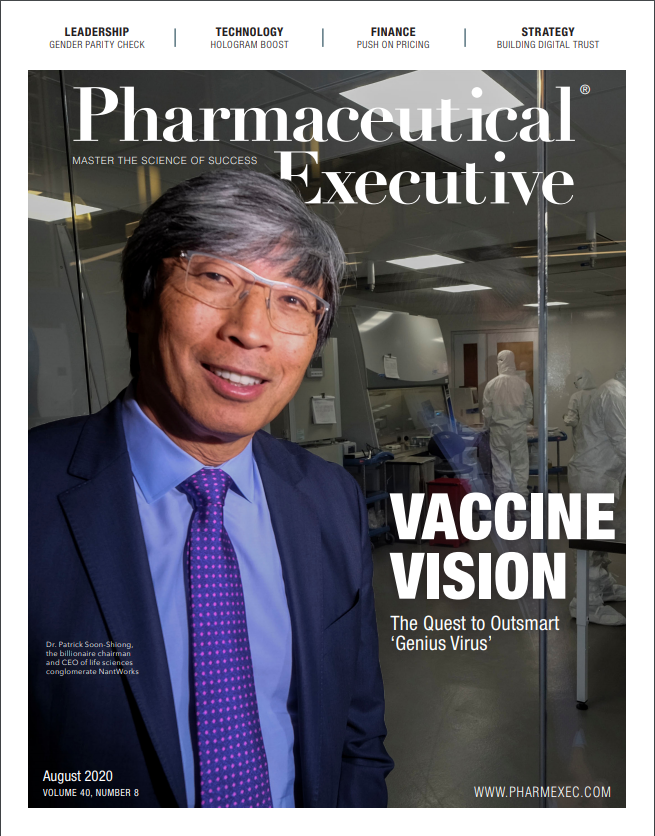- Sustainability
- DE&I
- Pandemic
- Finance
- Legal
- Technology
- Regulatory
- Global
- Pricing
- Strategy
- R&D/Clinical Trials
- Opinion
- Executive Roundtable
- Sales & Marketing
- Executive Profiles
- Leadership
- Market Access
- Patient Engagement
- Supply Chain
- Industry Trends
Drug Pricing Back in the Spotlight
Should therapies and vaccines be cheap or free in a pandemic and would that really dry up innovation?

As the world waits anxiously for more effective COVID-19 treatments and for a vaccine to halt the pandemic, analysts on all sides are examining appropriate pricing models for these critical products. Gilead’s $3,000 price tag on remdesivir ($2,300 for US public health programs), set in late June, came in lower than financial analysts expected, but still outraged consumer advocates and liberal politicians. Skepticism has greeted promises from some vaccine makers pledging to offer preventives on a no-profit basis due to uncertainty about what that promise means and the timeframe for free or low-cost programs. Meanwhile, Congressional leaders are adding modest drug pricing provisions to new legislative proposals, consumer groups are complaining about annual pharma price hikes, and the White House still signals plans for administrative action to link US drug prices to international rates.
Jill Wechsler

The debate over access to and pricing of safe and effective COVID vaccines has heated up as several candidates move into later-stage clinical trials. If based on estimated cost savings to healthcare systems and to the global economy, the value of successful vaccines would be multi-billions of dollars. But few believe that most of those benefits should go to the manufacturer.
Leading vaccine makers Johnson & Johnson and AstraZeneca have stated they plan to offer their treatments on a no-profit basis, but it’s not clear what “no profit” means here. Pfizer recently agreed to provide 100 million doses of its anticipated COVID vaccine for $1.95 billion, which sets the price at $19.50 per dose; other agreements between the UK and vaccine makers imply prices of $10 to $3 a dose. Congressional leaders are insisting that COVID vaccines be available at no cost to Americans, as outlined in a recent white paper from Senate Democrats that maps out policies for “Getting a Safe and Effective Vaccine to All.”
A related issue is to what extent support from the NIH or the Biomedical Advanced Research and Development Authority (BARDA) should affect prices. Analysts put federal government support for Gilead’s remdesivir at around $6.5 billion. The Institute for Clinical and Economic Review (ICER) initially said that the drug’s announced price was in line with its earlier cost-benefit analysis that supported a price of $2,800 for treatment, but only if the therapy actually saves lives (which Gilead now says it does).
These and other issues related to prices for COVID-19 drugs and vaccines were the subject of a recent webinar hosted by the National Pharmaceutical Council (NPC). Is there something unique about a pandemic that alters how one looks at drug pricing, and should that translate into paying more—or less—for remedies? asked NPC chief scientific officer Robert Dubois. Would too-low prices curb future innovation, as industry and investors insist, or does more profit block equitable public access to drugs and vaccines?
The drug pricing conversation is different in a pandemic, where everyone’s goal is to “get back to normal,” observed ICER executive VP Sarah Emond. And that outcome should be rewarded, according to Craig Garthwaite of the Kellogg School of Management at Northwestern University. At the same time, the system needs to ensure public access to drugs and vaccines, noted Peter Neumann of Tufts University Medical Center. Instead of focusing on cost and profit and future innovation, Peter Bach of Memorial Sloan Kettering’s Center for Health Policy & Outcomes urged industry to invest in obtaining sound data from randomized, placebo-controlled clinical trials to ensure appropriate use of a new therapy and to fully understand its value.
The visible commitment of biopharma companies to developing and producing critical therapies and vaccines to combat the pandemic has boosted the public’s regard for the industry. But that could plummet if new treatments prove too costly or unavailable to certain population groups. These issues were raised at recent hearings on Capitol Hill, where some members of Congress continue to call for Medicare to negotiate drug prices and for the feds to exercise “march-in rights” to seize patents from biopharma companies that accept federal funding but then fail to make resulting products available on “reasonable terms” to the public. And to ensure that prices and access are “reasonable,” all parties will be comparing what COVID-19 therapies cost in the US to the rest of the world and how any differences in the global market affect American patients.
Jill Wechsler is Pharmaceutical Executive’s Washington Correspondent. She can be reached at jillwechsler7@gmail.com.

